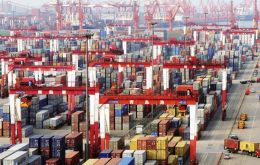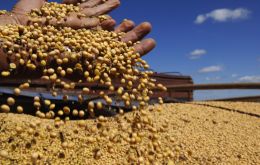MercoPress. South Atlantic News Agency
Tag: soybean oil
-
Saturday, August 15th 2020 - 09:22 UTC
Argentine soy oil contracts under pressure from “wash out” by Chinese importers

Chinese importers have started to practice “wash out” with Argentine soy oil contracts, which is having an impact on the local industry.
-
Thursday, May 24th 2018 - 07:32 UTC
China expected to import record volumes of US oil and soy, to help ease trade tensions with the US

China will import record volumes of U.S. oil and is likely to ship more U.S. soy after Beijing signaled to state-run refiners and grains purchasers they should buy more to help ease tensions between the two top economies, trade sources said on Wednesday.
-
Friday, February 9th 2018 - 20:18 UTC
Brazilian current soy crop estimated at 110.4m tons, but 3.2% less than last year

In their latest monthly report, Conab (National Supply Company) increased their estimate of the 2017/18 Brazilian soybean crop by 1.2 million tons and they slightly increased their Brazilian corn estimate. Conab is now estimating the 2017/18 Brazilian soybean crop at 110.4 million tons which is 1.2 million tons more than last month's estimate (109.1 million tons). If realized, the 2017/18 crop would be 3.6 million tons lower than the 114.0 million tons produced last year (-3.2%).
-
Wednesday, January 3rd 2018 - 10:19 UTC
Lack of rainfall in Buenos Aires province affecting soy planting and prices

Argentina's bread-basket province of Buenos Aires will remain mostly dry over the days ahead, meteorologists said on Tuesday, after reporting scant rains over the weekend in the country's biggest and most productive farm area.
-
Friday, July 12th 2013 - 20:41 UTC
EU bio-diesel tariffs and China’s policy change threaten Argentina’s soy-oil industry

The export price of Argentine soy-oil has plummeted 21% so far this year, due to new European bio-diesel tariffs and China’s change of policy, putting one of the country's key industries at risk. Argentina is the world's top exporter of soy-oil, which is used to make bio-diesel.
-
Saturday, August 11th 2012 - 11:03 UTC
China only interested in commodities, not in products that reach supermarkets

Trade with China for Argentina has great opportunities but also great threats because the Asian giant is only interested in produce with no added value, warned the head of Argentina’s Industrial Union, Ignacio De Mendiguren.
-
Wednesday, June 29th 2011 - 23:03 UTC
KLM will begin fuelling some of its flights with used cooking oil

Dutch carrier KLM announced Wednesday it would begin using used cooking oil for some of its flights. The announcement comes less than two years after the airline flew the first bio-kerosene-fuelled passenger flight in Europe.
